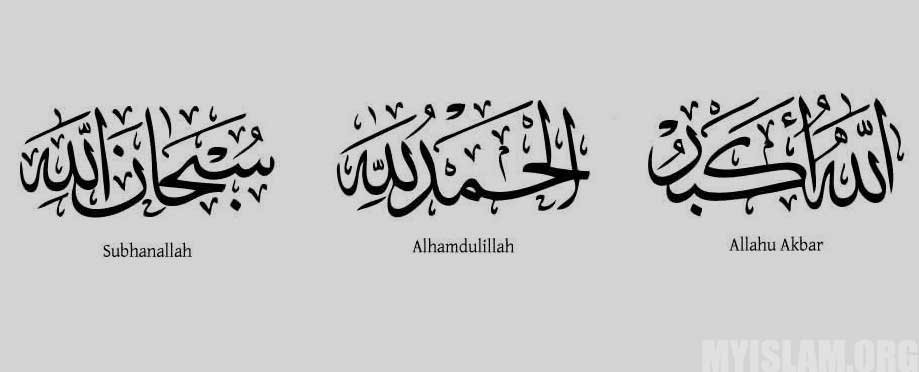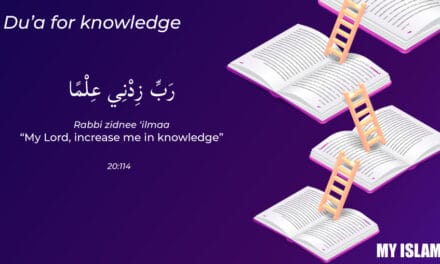
Three words, Subhanallah, Alhamdulillah and Allahu Akbar are some of the best form of dhikr with extensive rewards that will raise your rank in the here after.
In Jami At Tirmidhi hadith 3375, it says,
Abdullah bin Busr (ra) narrated that: A man said: “O Messenger of Allah (ﷺ), indeed, the legislated acts of Islam have become too much for me, so inform me of a thing that I should stick to.” He (ﷺ) said: “Let not your tongue cease to be moist with the remembrance of Allah.”
And in Surah Ahzab, ayah 41 Allah gives us the command,
“O You who believe! Remember Allah with much remembrance”
This dhikr, is potent and is said to be light on the tongue but heavy on the scale.
Meaning and Benefits of Alhamdulillah Subhanallah, Allahu akbar
In hadith Riyad As-Salihin book 16, hadith 12 it mentions all the sins of a person will be forgiven even if it could cover the surface of the sea.
This would be done for the person who recits subhanallah thirty three times, alhamdulillah thirty three times, and allahu akbar 33 times, and then recites la ilaha illallahu, wahdahu la sharika lahu, lahul-mulku wa lahul-hamdu, wa Huwa ala kulli shai’in Qadir once for a total of 100 dhikr.
In Sahih Bukhari 3113, The Prophet (saws) said, “Shall I tell you a thing which is better than what you asked me for? When you go to your beds, say: ‘Allahu Akbar (i.e. Allah is Greater)’ for 34 times, and ‘Al hamdu Li llah (i.e. all the praises are for Allah)’ for 33 times, and Subhan Allah (i.e. Glorified be Allah) for 33 times. This is better for you than what you have requested.”
Hadith on Dhikr
Abu Hurairah (May Allah be pleased with him) reported:
The Messenger of Allah (ﷺ) said, “He who recites after every prayer: Subhan-Allah (Allah is free from imperfection) thirty-three times; Al-hamdu lillah (praise be to Allah) thirty-three times; Allahu Akbar (Allah is Greatest) thirty-three times; and completes the hundred with: La ilaha illallahu, wahdahu la sharika lahu, lahul-mulku wa lahul-hamdu, wa Huwa ‘ala kulli shai’in Qadir (there is no true god except Allah. He is One and He has no partner with Him. His is the sovereignty and His is the praise, and He is Omnipotent), will have all his sins pardoned even if they may be as large as the foam on the surface of the sea.”
[Muslim].
Reference: Book 16, Hadith 12
Arabic/English book reference : Book 16, Hadith 1419
It’s important for Muslims that are non-native Arabic speakers to understand what we are saying, otherwise it can be quite a dull experience and seem like a chore we have obliged to do. When we truly understand and are passionate we can be moved emotionally and derive joy from reciting these words. It no longer becomes a dreaded task.
We may get distracted in life with trying to advance our career, job, or business. But understand it is Allah’s will that allows these things to happen. And we learn in Sahih Al-Bukhari 7405 that Allah says,
I am just as My slave thinks I am, (i.e. I am able to do for him what he thinks I can do for him) and I am with him if He remembers Me. If he remembers Me in himself, I too, remember him in Myself; and if he remembers Me in a group of people, I remember him in a group that is better than they; and if he comes one span nearer to Me, I go one cubit nearer to him; and if he comes one cubit nearer to Me, I go a distance of two outstretched arms nearer to him; and if he comes to Me walking, I go to him running.
These are words for the remembrance of Allah.
Subhan Allah (Arabic: سبحان الله) means “Allah is free from imperfection”.
Al-hamdu lillah (Arabic: الحمد لله) means “All praise is due to Allah”.
Allahu Akbar (Arabic: الله أكبر ) means “Allah is Greatest”.
La ilaha illallah (Arabic: لَا إِلَٰهَ إِلَّا ٱللَّٰهُ) means “There is no deity but Allah”.
Utter these words mindfully and inshallah Allah will be by your side.
Allah will not call you to account for that which is unintentional in your oaths, but He will call you to account for that which your hearts have earned. And Allah is Oft-Forgiving, Most-Forbearing. (2:225)




Many Thanks to Allah Most Gracious Most Merciful. Alhamdullilah Rabbi illah min Ameen. May Allah continue to bless protect and guide us very well.
Dua ki jaroorath hai